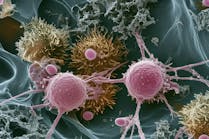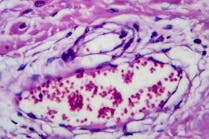In a new study published in the journal Neoplasia, researchers at Moffitt Cancer Center model how interactions between cancer cells and immune cells, and their subsequent responses to radiation, impact the tumor, according to a news release.
They say their computer-based model may help to predict how patients respond to radiation therapy.
Cancer patients respond differently to radiation therapy based on the type of tumor they have, as well as individual genetic factors. Additionally, tumors contain a variety of different immune cells, vascular networks and surrounding tissue architecture that greatly influence treatment responses. For example, the presence of a high number of suppressor immune cells allows for tumor cells to escape cell death, while a high number of immune effector cells can promote cancer cell death. Many emerging therapies are trying to improve radiation therapy by enhancing the effects of immune effector cells; however, given the wide range of radiation doses, schedules, and timing scenarios, it is difficult to determine the best clinical approach.
Moffitt researchers decided to take advantage of the advances in mathematical modeling to improve their understanding of cellular responses to radiation therapy. They developed a computer model to study the relationship between the tumor-immune environment and a tumor’s response to radiotherapy, with and without specific patient factors. Within their model, they included factors such as cell proliferation, migration, cell death, immune cell motility, cell to cell interactions and the cytotoxic impact of radiation.
From their model, the research team discovered that tumor cells will either escape immune predation or be eradicated by the immune system based on the numbers of immune effector and suppressor cells present. They analyzed samples from 10,469 patients across 31 tumor types and were able to estimate tumor, immune effector and immune suppressor cell numbers in each tumor. They mapped these results into their model to reveal that radiation therapy has the potential to shift the immune environment into one that supports tumor eradication, while other tumors that do not experience this shift will likely regrow. The researchers combined the factors that predicted these radiation-induced shifts into an individual Radiation Immune Score (iRIS).
The researchers then used their model to analyze data from non-small cell lung cancer (NSCLC) patients who received radiation and demonstrated that the iRIS score correlates with tumor responses to radiation and the overall survival of the patients. They found that the combination of the iRIS values with a second biomarker that estimates tumor radiosensitivity called the radiosensitivity index (RSI) stratifies patient responses to radiation therapy, with low RSI and low iRIS scores being associated with enhanced radiocurability.
With this model, it could be possible to simulate how individual patients would respond to radiation and predict the minimal radiation dose required to achieve tumor control with and without help from immune targeting agents. With their model, about half of NSCLC patients were predicted to have durable tumor control with a lower radiation dose, whereas 40% needed a higher radiation dose.





